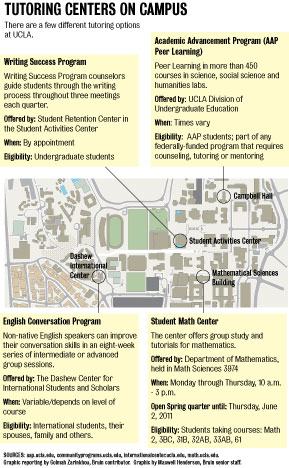Correction: In the original version of this article, Allison Wong’s name was misspelled.
Two new, proposed tutoring centers geared toward science and writing composition may help fill the gap left by closing the Covel Peer Learning Labs ““ if enough funding is granted.
Tutoring services will be delegated to experts in each academic area. These experts will run their tutoring separately to split the costs between the university and each department.
But peer learning advocates are hesitant to accept the new plans before more financial details are available.
Judith Smith, vice provost and dean of undergraduate education, said she is working to secure a donation for these centers and to make sure separate departmental units can run them by January at the latest.
Smith said her vision of the new centers will cost considerably less than Academics in the Commons, but she does not yet know how much. She said she will also allocate funds from her division toward a new student writing center, and the English department’s Writing Programs will run the center to directly replace Covel’s Composition/ESL Lab.
With enough funding, the center should open in the fall, Smith said. Housed in the Humanities Building, the writing center will likely employ undergraduates and teaching assistants.
Currently, Covel Peer Learning Labs offer tutoring for lower division chemistry, life sciences, physics and math courses.
The proposed science center will include elements of peer learning as well as drop-in tutoring for chemistry and life sciences core classes, but it may not open until January 2012. Smith did not confirm a space, but said she is currently negotiating for a specific one, and she hopes to rehire peer learning facilitators from the Covel labs.
Additionally, the Student Math Center in the Math Sciences Building offers math tutoring, and Smith said she wants to help it expand, although she has not contacted the center yet.
She said she will ask Chancellor Gene Block for seed money from the Dream Fund, which was a $200 million gift donated partly to support academic programs at UCLA.
If granted, the requested money would maintain the centers for four years, she said. During that time, she will look for private funding and donations to continue the programs.
“I think that we will certainly get some funding,” Smith said. “If we don’t get as much as we need, then we will simply be smaller starting out.”
In response to ending the Covel labs, a group comprised of peer learning facilitators and students has formed to support peer learning. The Save Covel group will meet with Smith next week with a written proposal not to break up tutoring services but to reinstate only the peer learning labs as a way to trim costs.
“I have grave concerns about the sustainability of (Smith’s) plan because she has not proposed future funding,” said Allison Wong, a peer learning facilitator on the group’s committee and fourth-year biochemistry student.
She added that decentralizing peer learning services into smaller programs makes the service as a whole more fragile because if other funding issues arise in the future, the programs could end with much less resistance.
The group’s proposal contains testimonials and statements from both students and faculty. It will argue that losing a strong peer learning system makes UCLA less competitive and will propose alternatives to the current restructuring plans, Wong said.
The group has compared UCLA’s peer learning model with those established at universities like UC Berkeley, Yale University and the University of Michigan.
“We learned they all have it, so they prioritize it, and we learned that … other models of restructure are possible (to cut costs),” Wong said.
Peer learning is a valuable resource because office hours are limited and often intimidating for students, and professors view student problems differently as experts in their fields, said Mike Rose, a professor in the Graduate School of Education and Information Studies.
“If you’re a physicist, it might be hard to put yourself in the shoes of a freshman,” he said. “(So) there’s a lot to be said about the “˜peer’ part of (peer learning).”
